Emirates' Flanagan
Greatest Airline Builder
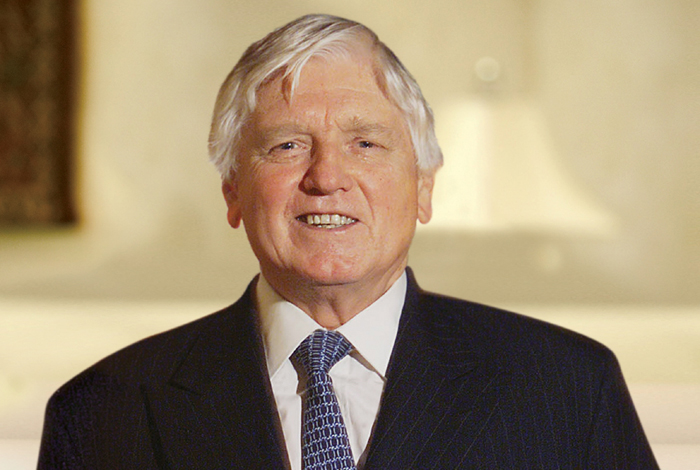
Ask Sir Maurice Flanagan,
KBE, CBE, BA, Hon. FRAeS, FRAeS, FCIT to suppose for a moment what history
might say about his spectacular and long-lived aviation career, which
has included the founding of a great global airline, and the Executive
Vice Chairman, Emirates Airline Group says simply:
“I've been lucky.
“I think it's that simple.”
Throughout history there has been much written
about men and women who have pioneered and changed history.
In aviation, Lindbergh and Earhart come
to mind.
Present at the creation, Sir Maurice Flanagan
continues upon an epoch journey begun some 34 years ago in Dubai, UAE.
Once upon a time, two leased-in aircraft grew into a transportation resource
that today reaches out on the wings of its airline to almost everywhere
on the planet.
As you read this, EK’s current fleet
of 153 is expanding with the addition of more aircraft every month, such
as B777s and A380s.
No one can doubt that Emirates, which began
a scant 25 years ago, has its gaze firmly fixed on becoming the greatest
international airline in the world.
Now in his 80s, Maurice Flanagan shows no
signs of slowing down, although there is a slight hitch in his giddy–up—he
moves around cane in hand due to some corrective knee surgery, which Dr.
Deepak Bhatia, his orthopaedic surgeon insists is prolonged in healing
because Sir Maurice insists on working out on his treadmill every day.
It’s a knee injury that preventing him from playing football and
made the Blackburn Rovers Football Club in Lancashire quite upset, but
the cargo community can thank that injury for leading him into the industry
as he abandoned sports and began work for British Overseas Airways Corporation.
But if speaking softly and carrying a big
stick is on the menu for this vital and connected man as he continues
his adventure at Emirates, so be it, as his outlook and views remain razor
sharp.
You learn something when you walk alongside
Maurice Flanagan. It happened to us a couple weeks ago in Dubai.
Despite some challenges, he takes the stairs
instead of the elevator.
He is tough as can be, sweet and human despite
seeming indestructible, with an abundant interest in all that is going
on around him.
Flanagan
Targets European Gateway Growth
“We need more capacity,” Sir
Maurice says, meaning new airplanes for his beloved Emirates, and also
new places to land the fleet like Berlin and Stuttgart Germany.
“Lufthansa hates us with a passion,
but the German government takes no notice.
“We have double daily Munich and Dusseldorf
while Hamburg will soon go double daily and we hope to increase Frankfurt
to triple daily. In addition we have eight weekly freighter flights to
Germany.
“We want Berlin and Stuttgart and
they are blocking us on that.
“But in Germany, the Mayors and population
of people who run the airports and cities want Emirates.
“And we will get there.
“Everything will fall into place.
“Even Canada will fall into place
eventually.
“Airlines historically represented
countries, so they received this kind of protectionist behavior.
“You can’t tell BMW not to produce
more cars than Germany wants—just like you cannot tell airlines
not to produce capacity.
“After all, airlines are a service.
“For example, the Canadian government
has restricted us to three flights a week, even though we could open several
double dailies into Vancouver, Toronto and so on.
“They are shooting themselves through
the foot.
“Where they (Canada) could benefit
from a major uptick in tourist and business traffic, instead their politicians
choose to protect Air Canada, which by any measure is just a financial
basket case.
“So we slot three A380s into Toronto
and wait for things to change.
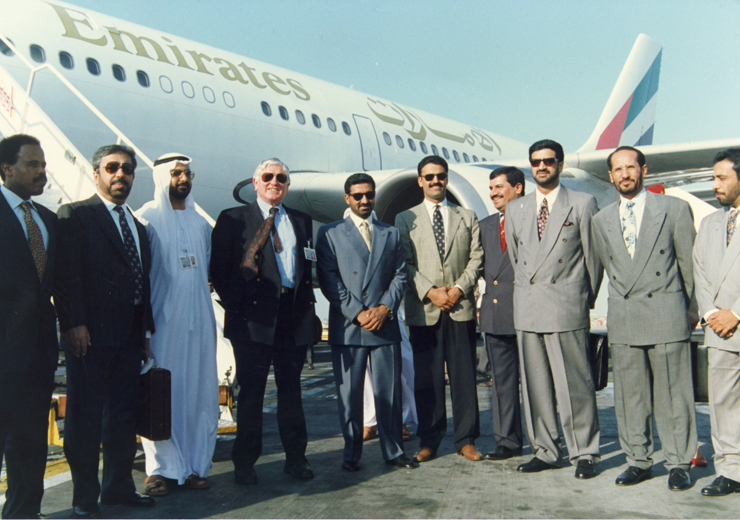 |
“Dubai offers complete
freedom of the skies,” says Sir Maurice, who apparently still prefers
to be spoken to simply as Maurice, as he quickly corrects this reporter.
“We began with a $10 million stake
and a couple of leased airplanes from PIA as a regional airline with absolutely
no protection, and we continue to operate in a fair and balanced competitive
airline environment in Dubai.”
Taking a wider view of things, we wondered
about the international airline industry and how Emirates was handling
some of the major challenges?
“The finances of the industry are
at present very dependent on the cost of aviation fuel.
“Last year it cost Emirates 40 percent
of all costs, more than the sum of the cost of owning our aircraft, our
total payroll.
“In the last three months of our financial
year, fuel reduced our bottom line by $250 million.
“So our very good financial result
for the year would have been $250 better, had it not been for that spike
in fuel cost.
“The fuel price impacts different
airlines differently, of course.
“A low-cost airline does not incur
many of the large costs which a full service airline such as Emirates
does.
“Therefore in normal times fuel would
be a much higher proportion of its total cost than with a full-service
airline.
“There is more to it than fuel costs
of course. Emirates exploit Dubai's geographical location - in the center
of the way the world works - to the hilt.
“With our long range aircraft we can
connect any two points in the world, with one stop only, in Dubai.
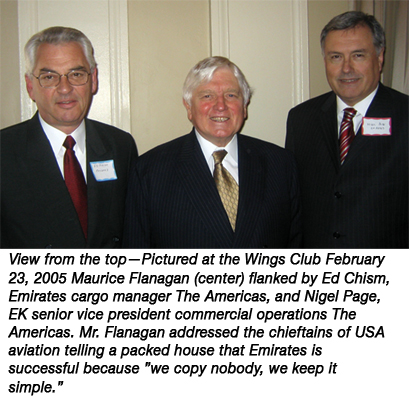 “We
fly non-stop to Los Angeles, San Francisco, Houston, Sao Paolo, Sydney,
Perth, Melbourne, and will shortly add Rio de Janeiro.and Buenos Aires. “We
fly non-stop to Los Angeles, San Francisco, Houston, Sao Paolo, Sydney,
Perth, Melbourne, and will shortly add Rio de Janeiro.and Buenos Aires.
“The point is that Dubai is a viable
north/south hub.
“Despite getting either an A380 or
a Boeing 777 almost every month for many years ahead, we are still short
of capacity, one of the reasons for Emirates' profitability.
“Other airlines are not so fortunate,
not only in geographical location, but in the quality of the ownership
and the management.
“For Emirates, looking ahead means
more of the same challenges - the imperative to expand rapidly, whilst
remaining profitable and maintaining a high standard of service.
“In terms of potential growth, I would
guess business travel and long haul tourism hold the greatest potential.
“Both are capable of further development,
and there are smart tour operators and airlines working on that.
“In principle, none of the fundamentals
have changed since I began in this business. Value for money still must
drive all that we do.”
Asked about new airlines that might achieve
major route and passenger/cargo numbers scale & success, Maurice Flanagan
noted:
“There may be new groupings as with
BA and Iberia, but I do not see major route and passenger/cargo numbers
scale & success.
“It is well established that economies
of scale go into reverse in airlines beyond what Christopher Chataway,
when he headed the British CAA, described as a relatively low point in
scale.
“Some airlines seem to think that
size, by amalgamation, will automatically bring economies of scale.
“It just does not work in that way.”
When we asked Sir Maurice to think back
over his career and recall what had surprised him, his answer was immediate
and direct:
“More than anything else, Dubai has
surprised me.
“I came here on secondment from British
Airways, for two years—33 years ago.
“I've seen centuries of change here
in that time, all to the good.”
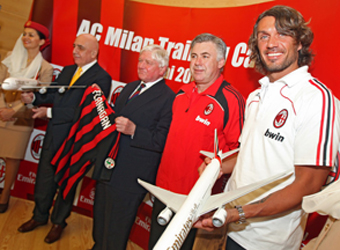 |
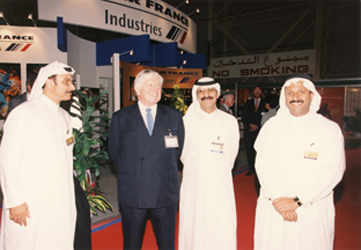 |
Maurice arrived in Dubai
in 1977, having been selected by the Government of Dubai to become General
Manager of Dnata, which was already emerging as the region’s leading
ground handler, General Sales Agent and travel agency. At that time the
business was still known as its full name - the Dubai National Air Travel
Agency and had no visibly recognized brand. One of his first tasks was
to oversee the creation of an identity for Dnata which would capture the
hearts and minds of Dnata’s customers and lead the business on to
even greater heights.
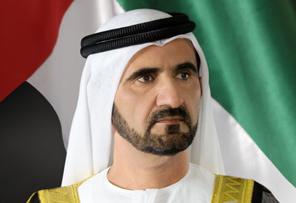 “It was Sheikh Mohammed’s vision and master plan that was
driving the airport and aviation business within Dubai – he had
the final say on the Dnata logo,” Maurice recalls. After a few observations
of his own, Sheikh Mohammed approved the crisp, modern red and yellow
logo, that would forge Dnata over the years which followed.
“It was Sheikh Mohammed’s vision and master plan that was
driving the airport and aviation business within Dubai – he had
the final say on the Dnata logo,” Maurice recalls. After a few observations
of his own, Sheikh Mohammed approved the crisp, modern red and yellow
logo, that would forge Dnata over the years which followed.
Under his guidance Dnata grew as Dubai and
its airport grew – constant increases in the number of airlines,
flights and passengers, all benefitting from Dnata’s renowned level
of service for the airlines and their customers. International expansion
began in 1993 with the company’s first foray into the overseas market
with a joint venture business in Pakistan, still operating today as Gerry’s
Dnata.
During the years in between, the Dnata business
has continued to grow exponentially and today is the fourth largest combined
air services provider in the world. Its global footprint has increased
still further by both growth and acquisition in recent years and the business
now has ground handling and catering operations spanning some 73 airports
in no fewer than 38 countries. Just in the last couple of weeks, after
a period of review, the Dnata brand has been re-launched with a fresh
new logo – rebranded as dnata - to take it forward into the coming
years.
We were also curious as to whether the growth
of regional and international airlines in the Middle East might lead to
an Emirates-led, SAS type of arrangement between the carriers
“That would never happen.
“There would be no advantage whatsoever
to Emirates; quite the opposite, and without Emirates it could not work.”
Emirates deserves to possess confidence
and swagger—it is well earned at this point in time. But there must
be some in the industry who resent or are envious of the rapid success
of Emirates. We asked Sir Maurice what he would say to those who proclaim,
“I hate Emirates!”
“I've never heard that said.
“The only response would be:
“Get a life!”
Sir Maurice’s sentiments are that there
couldn’t be much more that you would want from an airline; Emirates
has it covered. To those who believe that Emirates’ growth spurt
happened too quickly to retain momentum and excitement for the airline,
his response is simply,
“It's an assumption that might be
made by someone simply contemplating Emirate's rate of growth.”
When you fly Emirates, it is all class.
You would be hard pressed to find a negative experience among fliers,
and for that reason there are no plans in the future to add things like
low-cost services to the business package.
“Dubai's low cost service is there
already in FlyDubai, which has the same ownership and chairman as Emirates,
but is totally independent of Emirates,” says Sir Maurice.
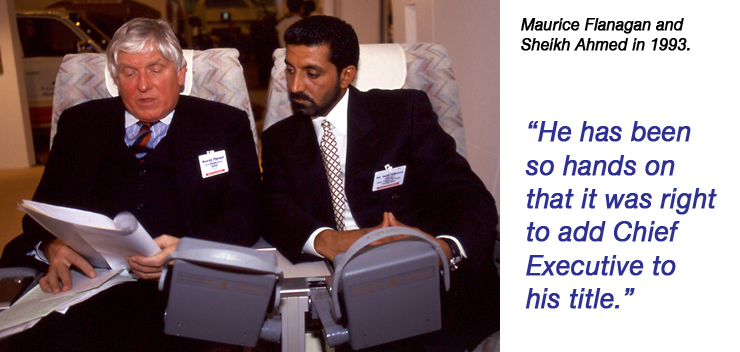 |
In 1985, Maurice Flanagan
was appointed by the Dubai government to start up an airline, and Emirates
is the happy, successful result. Dubai could not have placed the task
in more capable hands.
“I was selected by Sheikh Mohammed
to start the airline.
“When the airline started I had daily
airline tutorials with Sheikh Ahmed.
“He has a brilliant mind, and had
a memory like a steel trap.
“He has been so hands on that it was
right to add Chief Executive to his title last year.
“Today, Emirates Group is a community
of 50,000 people; that’s as much as a small town. That makes it
much more than an airline, particularly when you consider the multifarious
activities that come under Gary Chapman, President Dnata and Group Services.”
Finally, while he acknowledges that young
people today can still find airline business as he once did: “exciting,
with prospects of travel,” Sir Maurice admits that he might have
done something else with his life:
“I wrote a prize-winning TV play,
with Leonard Rossiter in the main role.
“It was suggested to me by Kenneth
Tynan, the theatre critic, that I should do that full-time, but I had
a stable career with BOAC at the time, and did not want to take the risk.”
So given the chance to take the other path,
would he choose an airline career again?
“Certainly,” Sir Maurice Flanagan
said.
“Dubai International traffic has grown
tenfold in ten years and it still continues at around 18 percent a year.
“The only other place that is happening
like Dubai is China.
“Elsewhere, growth is flat or declining.
“You don’t have to be in Dubai
very long to realize that extraordinary things happen here principally
because of leadership and the people.
“The visionary leadership here is
amazing and the reason I think for Dubai’s great success.”
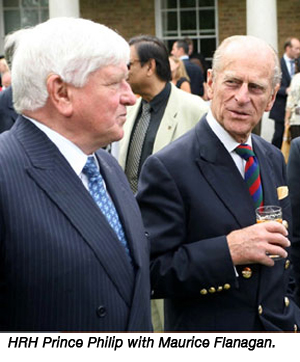 There is a down to earth and unaffected
side of Maurice Flanagan evident when he talks about his Knighthood by
Queen Elizabeth II.
There is a down to earth and unaffected
side of Maurice Flanagan evident when he talks about his Knighthood by
Queen Elizabeth II.
“The investment actually took place
in Abu Dhabi.
“That was quite a wonderful day, especially
since I was able to bring 20 people including my family and and our Chairman,
His Highness Sheikh Ahmed Bin Saeed Al Maktoum, to celebrate a very special
moment in my life
“If the ceremony had been held in
England, my guest list would have been just two.”
Asked what he does to relax, Sir Maurice
notes a fondness for “boogie-woogie, which I pick up on the computer
via You Tube.”
“I also enjoy playing that stuff on
keyboards.
“I enjoy the classics too, including
listening to the amazing voice of Kathleen Ferrier (English Contralto
1912-1953), especially when she sings Franz Schubert’s An Die Musik
or Dame Janet Baker, who among other works sang one of the most beautiful
arias of all opera, from Purcell's Dido and Aeneas.
“We also (with wife Audrey) are quite
fond of attending the Arabic Mass here where the singing is just magnificent.”
With his varied interests and talents, with
music, writing, athletic stamina and a fantastic attitude to push him
through, it is small wonder that Sir Maurice was able to take a modest
investment of $10 million and shortly turn it into one of the most successful
airlines on the planet.
We look forward to seeing what else he has
in store.
Geoffrey/Flossie |

 “We
fly non-stop to Los Angeles, San Francisco, Houston, Sao Paolo, Sydney,
Perth, Melbourne, and will shortly add Rio de Janeiro.and Buenos Aires.
“We
fly non-stop to Los Angeles, San Francisco, Houston, Sao Paolo, Sydney,
Perth, Melbourne, and will shortly add Rio de Janeiro.and Buenos Aires.


 “It was Sheikh Mohammed’s vision and master plan that was
driving the airport and aviation business within Dubai – he had
the final say on the Dnata logo,” Maurice recalls. After a few observations
of his own, Sheikh Mohammed approved the crisp, modern red and yellow
logo, that would forge Dnata over the years which followed.
“It was Sheikh Mohammed’s vision and master plan that was
driving the airport and aviation business within Dubai – he had
the final say on the Dnata logo,” Maurice recalls. After a few observations
of his own, Sheikh Mohammed approved the crisp, modern red and yellow
logo, that would forge Dnata over the years which followed.
 There is a down to earth and unaffected
side of Maurice Flanagan evident when he talks about his Knighthood by
Queen Elizabeth II.
There is a down to earth and unaffected
side of Maurice Flanagan evident when he talks about his Knighthood by
Queen Elizabeth II.